I still remember the time when my father’s idea of parenting was mostly about making sure we had a roof over our head, food on the table, and good marks in school. Emotions? That was a mother’s department. Discipline? That was dad’s territory. But somewhere between my childhood and today, parenting especially fatherhood in India has began to change. And I’m proud to be a part of that transformation.
This blog isn’t a research paper. It’s a reflection from one dad to another, from a husband to families navigating this new terrain. We’re not just changing nappies anymore; we’re shaping lives with our presence, love, and emotional investment.
The Old School Dads vs. The Modern Indian Dads
Back in the day, Indian dads were often distant figures. Their love was assumed but rarely expressed. Most of us grew up with the classic “silent provider” father, the one who’d wake up at 6, go to the office, return by 9, and expect discipline at home. The emotional connection was never absent, but it was never spoken.
Today? You’ll find Indian dads attending parent teacher meetings, packing tiffin boxes, recording baby milestones, and even reading bedtime stories in different voices.
What changed? A lot.
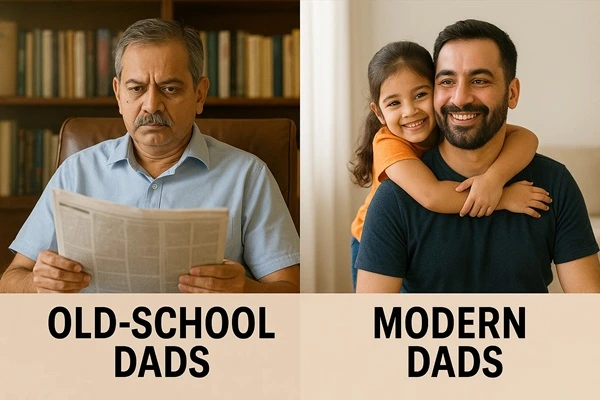
The Cultural Shift in Indian Parenting
Society evolved. Nuclear families replaced joint ones. Women entered the workforce in bigger numbers. And most importantly, fathers started seeing parenting not as a duty but as a joy.
We’re no longer just paying the bills. We’re actively involved in raising emotionally intelligent, kind, and balanced kids. And trust me, it feels incredible.
Why This Shift Is a Game Changer
Let’s talk honestly. Kids today deal with so much peer pressure, digital overload, mental health issues, and an intense race to “succeed”. They need both parents on board, emotionally and mentally.
Here’s what happens when dads show up emotionally:
- Children feel more secure: They grow up knowing they’re loved by both parents, not just the nurturing mother.
- Boys learn empathy: They see strength in emotion, not just in silence.
- Girls grow up with higher self-esteem: A father’s involvement teaches them respect, confidence, and self-worth.
- Fathers bond deeply: These years won’t come back. Being hands on creates lifelong memories and bonds.
What Emotional Involvement Looks Like for Indian Dads Today
No, we’re not talking about becoming second mothers. We’re talking about becoming whole parents. Here’s what that means in our Indian context:
1. Being Present
Not just physically, emotionally. Listening without fixing. Watching your child’s dance recital without checking your phone. Sitting on the floor and playing silly games. These are little moments, but they build unshakeable trust.
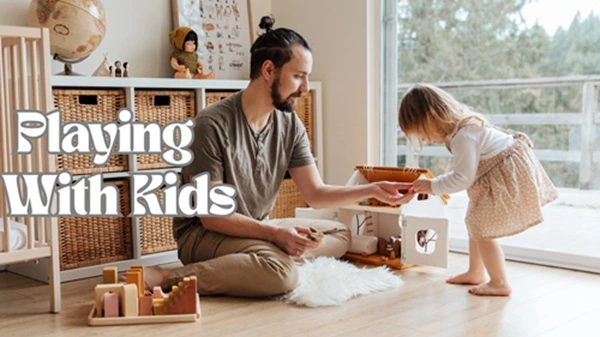
2. Expressing Love Openly
A hug. A “I’m proud of you”. A hand on the shoulder. These might have been rare gestures in our childhood, but today, they mean the world to our kids.

3. Sharing the Load
Helping with homework. Giving the baby a bath. Taking turns in night feeds. Cooking when your partner is tired. When kids see parents functioning as a team, they grow up valuing partnership.
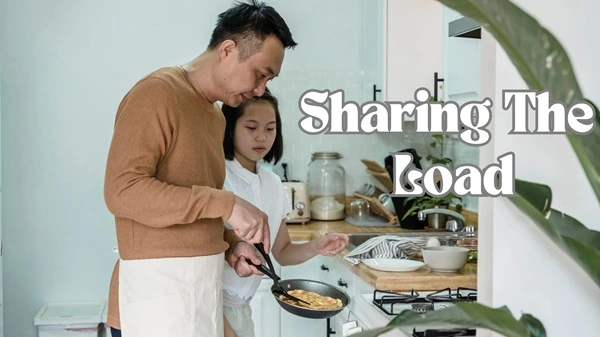
4. Allowing Vulnerability
Telling your kids, “I had a rough day,” or “I was scared too” teaches them it’s okay to feel and to express. You raise emotionally mature adults when you stop pretending to be a superhero.
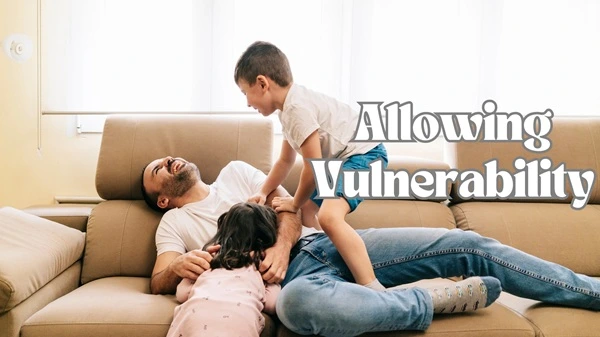
5. Being Their Safe Space
With the world putting pressure on them, home should feel like a cushion, not a battlefield. Fathers today are learning to be that emotional cushion too.
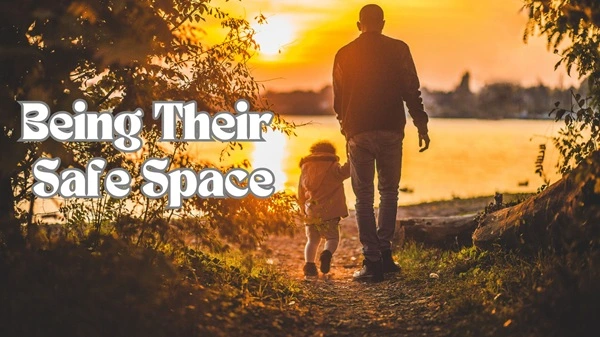
Stories from the New Age Indian Dads
Every time I visit a park or attend a school function, I see more and more fathers actively participating, not just attending, but engaging. My friend Rahul now works half days on Fridays to spend time with his daughter. Another dad, Imran, bakes cookies every Sunday with his kids. These are not one offs. This is a movement.
We’re no longer afraid to get our hands dirty, whether it’s changing diapers or facing tough questions about growing up.
Why Indian Society Needs More Emotionally Involved Dads
In a country where we often prioritize academic achievement over emotional well being, the presence of an emotionally aware father can be revolutionary. Our kids are growing up in a fast changing world, and emotional intelligence is no longer a luxury, it’s a necessity.
Modern dads help break generational chains of silence and suppression. We raise children who can talk, feel, express, and love freely.
It’s Not Always Easy, But It’s Worth It
Let’s not paint a rosy picture. Between work, pressure to provide, and societal expectations, it’s tough. But every effort counts.
Sometimes I mess up. I get impatient. I zone out. But then my son runs up to me with a story, or my daughter insists I tie her ponytail, and I’m reminded why this involvement matters.
Modern Indian Dads : Conclusion – From Fatherhood to Real Parenting
If you’re a dad reading this, know that your presence matters more than your paycheck. Your child needs you not just to fund their dreams, but to help shape them.
You don’t need to be perfect. You just need to be present. Not just in body, but in soul.
And years from now, your child might not remember how much you earned or how busy you were. But they will remember how you made them feel.
FAQs on Modern Indian Dads
Q1. Is emotional involvement necessary for Indian dads?
Absolutely. Kids today require emotional bonding and open communication. It helps their emotional development, reduces behavioral issues, and builds a strong foundation of trust.
Q2. How can working fathers make time for kids?
Even small consistent actions help, a bedtime story, helping with homework, playing on weekends, or having open conversations during dinner. It’s about quality, not quantity.
Q3. How does emotional fatherhood benefit boys and girls differently?
Boys learn to embrace emotions, reducing toxic masculinity. Girls develop high self-worth and are less likely to settle for disrespect in relationships later in life.
Q4. Is this new parenting style accepted in Indian society?
It’s growing. Urban parents, especially in metro cities and Tier 1 towns, are embracing this change. Rural areas are also slowly adapting with growing awareness.
Q5. Can fathers be primary caregivers?
Of course. Father led parenting is rising in India. Many dads are becoming stay at home fathers or taking on equal responsibility in dual income households.
Q6. How does this help the mother?
It creates a healthy partnership, reducing her physical and mental burden. Mothers feel seen, supported, and can also pursue careers or passions without guilt.
Want to know more or share your parenting journey? Drop a comment or write to me. We’re all learning, failing, and growing together.
Here’s to all the dads showing up, not just with their wallets, but with their hearts.
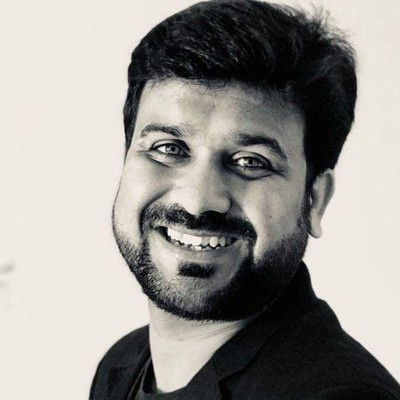
Hi, I’m Prashant Jain — a curious soul, storyteller, and content creator at heart.I’ve always been drawn to the world of entertainment, travel, sports, health & lifestyle — not just as a writer, but as someone who genuinely lives these experiences. Whether I’m binge-watching the latest OTT series, exploring offbeat spiritual destinations in India, or diving deep into wellness routines and cricket match insights, I love sharing what I discover with like-minded readers.
PopNewsBlend is my way of blending personal journeys with meaningful stories — ones that inform, inspire, and keep you ahead of the curve. Everything I write comes from real observations, hands-on experiences, and a deep passion for understanding the world around us.
Discover more from Popnewsblend
Subscribe to get the latest posts sent to your email.

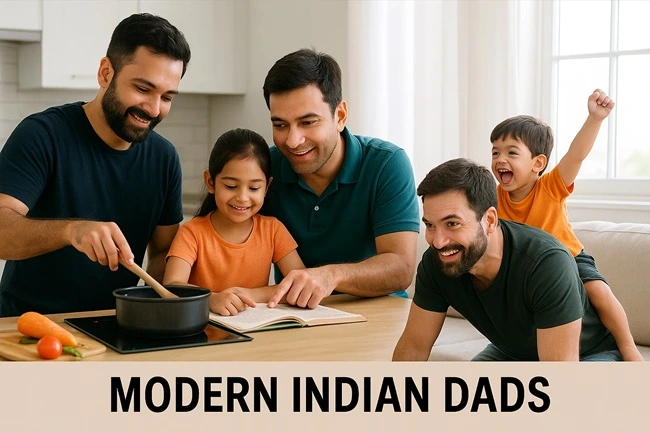





Pingback: Raising Creative Kids : Why Boredom Is the Secret Ingredient
Can you be more specific about the content of your article? After reading it, I still have some doubts. Hope you can help me.